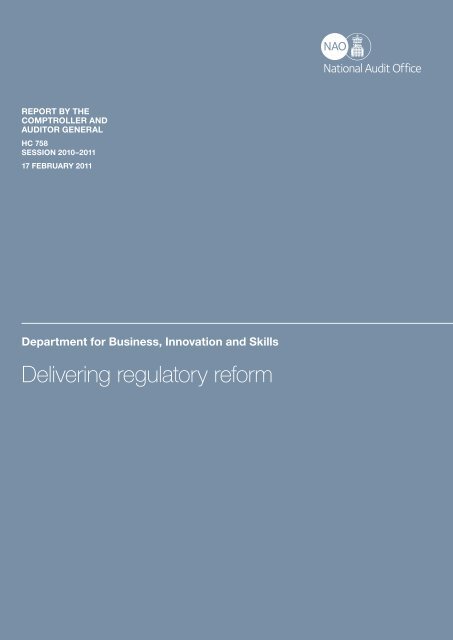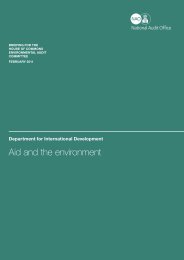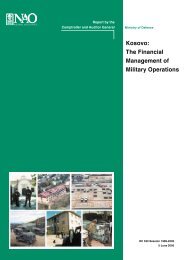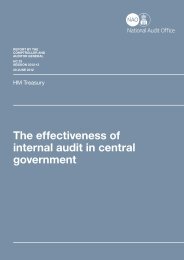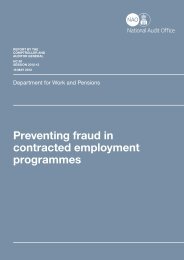Executive summary (pdf - 82KB) - National Audit Office
Executive summary (pdf - 82KB) - National Audit Office
Executive summary (pdf - 82KB) - National Audit Office
Create successful ePaper yourself
Turn your PDF publications into a flip-book with our unique Google optimized e-Paper software.
Report by the<br />
Comptroller and<br />
<strong>Audit</strong>or General<br />
HC 758<br />
SesSIon 2010–2011<br />
17 february 2011<br />
Department for Business, Innovation and Skills<br />
Delivering regulatory reform
4 Summary Delivering regulatory reform<br />
Summary<br />
Figure 1<br />
Background on regulatory reform<br />
What is regulation<br />
¬<br />
¬<br />
¬<br />
Regulation is a key tool used by departments to achieve policy objectives, such as providing protections<br />
and benefits to, for example, workers, consumers and the environment.<br />
Regulation encompasses a wide range of measures with legal force governing the way in which<br />
individuals or organisations carry out activities.<br />
Complying with regulation can create costs, for example, for businesses. The cost of compliance can be<br />
a direct cost, such as licences or buying equipment to comply with regulation, often known as the policy<br />
cost. Regulated entities also face indirect costs, for example the time spent understanding legislative<br />
requirements, which are usually referred to as administrative burdens.<br />
What is regulatory reform<br />
¬<br />
¬<br />
¬<br />
Regulatory reform seeks to achieve the right balance between the benefits of regulation and its costs.<br />
In various forms, it has been an aim of successive Governments since at least the 1980s.<br />
The previous government developed an agenda as part of its efforts to create the conditions for business<br />
success. Its focus was on ensuring ‘better’ regulation and placed emphasis on improving the regulatory<br />
and policy-making framework.<br />
The Coalition Government has clearly stated its belief that current levels of regulation are excessive, and<br />
reducing regulation for business is one of its key commitments. On 2 June 2010, the Department for<br />
Business, Innovation and Skills announced an action plan for reducing regulation with the aim of bringing<br />
an end to excessive regulation stifling business growth.<br />
Who are the key players<br />
¬<br />
¬<br />
¬<br />
¬<br />
The Better Regulation <strong>Executive</strong> is part of the Department for Business, Innovation and Skills and leads<br />
the regulatory reform agenda across Government.<br />
Each department has a Better Regulation Unit, which coordinates the reduction of bureaucracy and<br />
regulation resulting from the department’s policies.<br />
The Regulatory Policy Committee was established in 2009 to provide independent scrutiny of proposed<br />
regulatory measures.<br />
The Reducing Regulation Committee was established in May 2010 as a new Cabinet Committee to<br />
ensure there is a robust case for any new regulations.<br />
Source: The Department for Business, Innovation and Skills and the <strong>National</strong> <strong>Audit</strong> <strong>Office</strong>
Delivering regulatory reform Summary 5<br />
1 Regulation enables departments to advance important policy objectives and<br />
to deliver benefits in a wide range of areas for individuals, businesses and society.<br />
The Better Regulation <strong>Executive</strong> within the Department for Business, Innovation and<br />
Skills (the Department) has identified a number of ways in which regulation has the<br />
potential to support positive outcomes. For the economy, for example, regulation makes<br />
a difference by supporting common standards and fostering competitive markets.<br />
For the environment, both now and for future generations, there are many regulations<br />
that have improved the quality of the environment; and for citizens, especially the most<br />
vulnerable, regulation makes a difference in the workplace and in reducing inequalities.<br />
2 Regulation also creates costs through the obligations it places on businesses<br />
and others. Good management of the costs and benefits resulting from regulation is<br />
therefore an important element of achieving value for money in government.<br />
3 The Better Regulation <strong>Executive</strong> leads on reforming regulation, but responsibility<br />
for developing and controlling regulation is shared across departments. The direct cost<br />
of the Better Regulation <strong>Executive</strong> totalled some £6 million in 2009-10. We estimate that<br />
departments’ better regulation units cost a further £2.2 million. Regulatory reform also<br />
affects the costs of departments’ policy development activities, but departments do not<br />
monitor costs at a level that would distinguish these costs from other policy development<br />
costs. All such costs are small compared with both the benefits and costs created by<br />
regulations themselves. Good value for money therefore consists in achieving these<br />
benefits whilst bearing down on the costs of both regulations and their management.<br />
4 The <strong>National</strong> <strong>Audit</strong> <strong>Office</strong> has produced a number of reports since 2001 on aspects<br />
of regulatory reform, in particular the Impact Assessment process, the Administrative<br />
Burdens Reduction Programme, and business perceptions of regulation. Despite<br />
considerable efforts to improve the business experience of regulation, there has been<br />
little discernable progress in improving business perceptions of regulation. This report<br />
therefore examines the overall management of regulation across central government,<br />
focusing on the impact of regulation on business (Part One), how departments choose<br />
to regulate (Part Two), and the implementation of regulation (Part Three).<br />
5 Following the change of Government in May 2010, the Coalition Programme<br />
included several commitments to regulatory reform. The Coalition has established<br />
new principles to underpin its approach to regulation including a strong emphasis<br />
on regulating only where satisfactory outcomes cannot be achieved by alternative,<br />
self‐regulatory, or non-regulatory approaches. This report focuses both on the<br />
experience of the work done before May 2010, and on the intentions of the changes<br />
made since then and progress in implementing them.
6 Summary Delivering regulatory reform<br />
Key findings<br />
The impact on business<br />
6 Government understands which areas of regulation concern business most<br />
but does not know what the total impact of regulation is on business. Research<br />
by the Better Regulation <strong>Executive</strong> in 2006 estimated that just the administrative cost<br />
of regulation to UK businesses was some £13 billion a year, but there is no comparable<br />
estimate of the total cost of the existing stock of regulation. Since 2009, the Better<br />
Regulation <strong>Executive</strong> has compiled, and published at intervals, a Forward Programme,<br />
which in March 2010 projected total costs across the whole economy of £9.9 billion<br />
a year from new regulation planned to be introduced by April 2011. Total benefits to<br />
society from this regulation were projected at £11.6 billion a year. Within these totals, the<br />
impacts and benefits for business were not separately identified. The new Government<br />
has said it will continue to publish a forward regulatory statement and this is expected<br />
to specifically identify costs and benefits to business; however, publication has not yet<br />
taken place.<br />
7 Businesses generally recognise the purpose of regulation, but believe it<br />
can be unnecessarily burdensome, particularly on the smallest businesses.<br />
The purpose of regulation is to provide protections and benefits to, for example, workers<br />
and consumers and 58 per cent of businesses surveyed by us in 2010 said that they<br />
were generally clear as to its purpose. Some areas of regulation, however, in particular<br />
employment legislation, were perceived to be more of a burden, as indicated by 13 of<br />
our 17 case study businesses. Smaller businesses also perceived they are more affected<br />
by regulation than larger businesses because regulatory provisions are often imposed<br />
irrespective of size.<br />
8 Businesses, in particular small and medium enterprises, often lack clarity<br />
about how to comply fully with regulation. The totality of regulation faced by an<br />
individual business is complex and businesses that we interviewed typically have to<br />
consider as many as 60 regulations covering areas such as employment, planning,<br />
health and safety and sector specific regulation, and governed by multiple regulatory<br />
bodies. Many businesses interviewed could not identify all the regulations affecting<br />
them. As a result, some businesses fall into non-compliance, which can counteract the<br />
intention of the original legislation and lead to significant costs for the business.<br />
9 Businesses report that they find it difficult to keep up with the extent<br />
of new regulations and changes to existing legislation. The Better Regulation<br />
<strong>Executive</strong>’s March 2010 Forward Programme set out 265 new regulations that could be<br />
implemented by April 2011. Since October 2004 the Business Link website shows there<br />
have been 387 separate updates to existing regulations which have a direct impact on<br />
businesses. This equates to more than one a week.
Delivering regulatory reform Summary 7<br />
10 Departments are not communicating effectively with business. Businesses<br />
show a low awareness of government attempts to reduce regulation, and the use of<br />
Businesslink.gov.uk, the central source for regulation information and guidance, is<br />
limited, with only 34 per cent of businesses surveyed by us in 2010 using it. To help<br />
them understand their requirements and ensure compliance with the law, businesses<br />
more often rely on business and trade organisations, or bought-in expertise. The<br />
Better Regulation <strong>Executive</strong> has undertaken work to improve guidance produced by<br />
departments, but our survey work shows this remains a concern for businesses. Direct<br />
contact between businesses and government is typically through the enforcement<br />
regime; businesses we interviewed reported that this is most effective when provided by<br />
a knowledgeable individual with an emphasis on working together towards compliance.<br />
Choosing how and when to regulate<br />
11 Our past work on Impact Assessments has highlighted recurrent<br />
weaknesses in departments’ assessments of costs and benefits when designing<br />
regulation. In addition, departments’ Impact Assessments of proposals from the<br />
European Union have often not been prepared early enough to inform negotiations at<br />
this level. The Better Regulation <strong>Executive</strong>’s compilation of a Forward Programme, has,<br />
however, provided a basis for managing the total flow of proposed regulation and it uses<br />
its influence with departments to challenge proposed policies to reduce the burden of<br />
regulation when appropriate.<br />
12 Policymakers enter a formal consultation when designing new legislation,<br />
but this is late in the process. We found evidence that many policymakers informally<br />
consult business, in particular through business and trade organisations, in advance<br />
of formal consultation and found this had benefited their approach; but it is hard for<br />
departments to engage with smaller businesses to the same extent.<br />
13 The Coalition Programme included commitments to reducing regulation,<br />
for example, through the introduction of a One-In, One-Out system where the<br />
cost of new regulations must be compensated for by a corresponding cut.<br />
In December 2010 the Better Regulation <strong>Executive</strong> published Reducing Regulation Made<br />
Simple, setting out more fully the Coalition’s approach to regulation. To bring greater<br />
oversight and challenge to new regulation across departments the Government has<br />
also created the new Reducing Regulation Committee at Cabinet level, and increased<br />
independent review of regulation by the Regulatory Policy Committee. The Better<br />
Regulation <strong>Executive</strong> has yet to set out detailed plans for delivering this new strategy.
8 Summary Delivering regulatory reform<br />
Effective implementation<br />
14 The Better Regulation <strong>Executive</strong> has made good progress in assessing<br />
individual regulators and commenting on their effectiveness. A review by<br />
Sir Philip Hampton in 2005 set out principles for regulators on inspection and<br />
enforcement and the Better Regulation <strong>Executive</strong> conducted 36 implementation reviews<br />
of national regulators between 2007 and 2010. Our 2008 appraisal of the first five major<br />
reviews was largely positive about the approach and practices adopted by regulators,<br />
but highlighted some weaknesses in the regulators’ interaction and communication<br />
with businesses.<br />
15 Departments do not routinely evaluate the realised impact on business of<br />
regulation once it has come into effect. Our past work on Impact Assessments has<br />
highlighted that there is little post implementation review of regulation and in a further<br />
review of 25 Impact Assessments dating from 2008-09 and 2009-10 we found that<br />
only five provided for the collection of information to enable a detailed review. As a<br />
consequence, departments are poorly placed to measure the costs and benefits of<br />
regulation to business once regulation is implemented, or to make adjustments to<br />
improve the balance between costs and benefits in light of experience.<br />
16 The Coalition Programme included commitments to impose sunset clauses<br />
for new regulations and regulators and to end ‘tick-box’ regulation. Implementation<br />
of sunsetting clauses for new regulations, so that they automatically expire after a set<br />
period unless departments take positive action to keep them in force, is intended to<br />
strengthen post-implementation review. The Better Regulation <strong>Executive</strong> is working up<br />
proposals for how to take these commitments forward.<br />
17 Departments are currently conducting reviews of the stock of regulation in<br />
a number of areas, but there is a lack of a systematic approach and no overall<br />
attempt to review the totality of stock which businesses face. There are benefits<br />
to a more comprehensive approach. The Department for Environment, Food and Rural<br />
Affairs is using a rolling programme of reviews to inform its position for One-In, One-Out<br />
and understand its whole regulatory stock.
Delivering regulatory reform Summary 9<br />
Conclusion on value for money<br />
18 As with government spending, achieving sustainable reductions in regulatory costs<br />
whilst maintaining public value requires a structured and planned approach sustained<br />
over a period of years. Since the Better Regulation <strong>Executive</strong>’s creation in 2005, it<br />
and departments have developed important elements of such an approach and have<br />
delivered significant benefits. However, they are not yet in a position to achieve value for<br />
money in their management of regulation as gaps remain in two important areas:<br />
a<br />
b<br />
Understanding the impact on businesses. The Better Regulation <strong>Executive</strong> and<br />
departments understand the issues of most concern to businesses, but do not<br />
have adequate sight of the totality of regulation faced by businesses. There have<br />
also been systematic weaknesses in estimating the costs and benefits of individual<br />
regulations and little priority to reviewing impacts once regulation is implemented.<br />
Developing a coherent framework to manage regulatory reform. The Coalition<br />
Programme has set the Better Regulation <strong>Executive</strong> and departments a number of<br />
objectives for regulatory reform. Experience of the past suggests that to implement<br />
these across government will require clear accountabilities and effective incentives<br />
for departments, for the Better Regulation <strong>Executive</strong> to develop a detailed plan for<br />
delivery and for longer term management of the flow of regulation, comparable with<br />
the arrangements for managing public expenditure.<br />
Recommendations<br />
19<br />
a<br />
We make the following recommendations:<br />
Good information and coordination is essential for the effective management<br />
of the use of resources. Past work to measure administrative costs and<br />
compilation of a Forward Programme of proposed new regulations have helped<br />
in managing these aspects of regulation and strengthening incentives for<br />
departments. Departments and the Better Regulation <strong>Executive</strong> know which<br />
areas of regulation continue to concern business most but do not have a clear<br />
picture either of the size of the policy costs and benefits resulting from the stock<br />
of existing regulation, or of the capacity of businesses and others to respond to<br />
new proposals. The Better Regulation <strong>Executive</strong> should identify cost-effective<br />
ways of strengthening its understanding of the costs and benefits of regulation as<br />
experienced by business and use their findings to guide future work on reviewing<br />
and reforming regulations.
10 Summary Delivering regulatory reform<br />
b<br />
c<br />
d<br />
e<br />
f<br />
Departments differ in the vigour with which they are seeking to identify<br />
opportunities to simplify regulations. The Department for Environment, Food<br />
and Rural Affairs is reviewing all of its stock of regulation in order to identify<br />
opportunities to reduce regulatory costs in order to offset the cost of proposed<br />
new regulations. Other departments are not, however, and all departments should<br />
consider such a review.<br />
Evaluation and feedback remains a weak element of regulatory management.<br />
The Better Regulation <strong>Executive</strong> has recently implemented changes intended<br />
to improve in this area. It should also work with departments to strengthen<br />
incentives for departments to plan, and then carry out, evaluation of regulations<br />
after they have been implemented, and to use the findings to revise the<br />
regulations accordingly.<br />
Businesses remain concerned that they are not consulted before new<br />
regulations are introduced. Policy-makers should increasingly try to engage<br />
with businesses before formal consultation, using routes such as business<br />
organisations, the Small Firms Database and stakeholder groups. Details of this<br />
informal consultation should be included and published in Impact Assessments.<br />
There is as yet no detailed implementation plan in place for delivering<br />
the Coalition Government’s regulatory reform objectives. To strengthen<br />
its programme management approach the Better Regulation <strong>Executive</strong> should<br />
develop and consult on an implementation plan covering the life of the new<br />
regulatory reform programme. The plan should define what success will look like<br />
and how it will be measured, and include a timetable for activity, as a baseline for<br />
the programme management of regulatory reform in the future.<br />
Clarity over accountability and effective incentives on departments are<br />
important in achieving good quality regulation. To improve the quality of<br />
regulation the Better Regulation <strong>Executive</strong> should work together with the Cabinet<br />
<strong>Office</strong> to develop a clearer statement of accountabilities for departments and the<br />
Better Regulation <strong>Executive</strong>.


